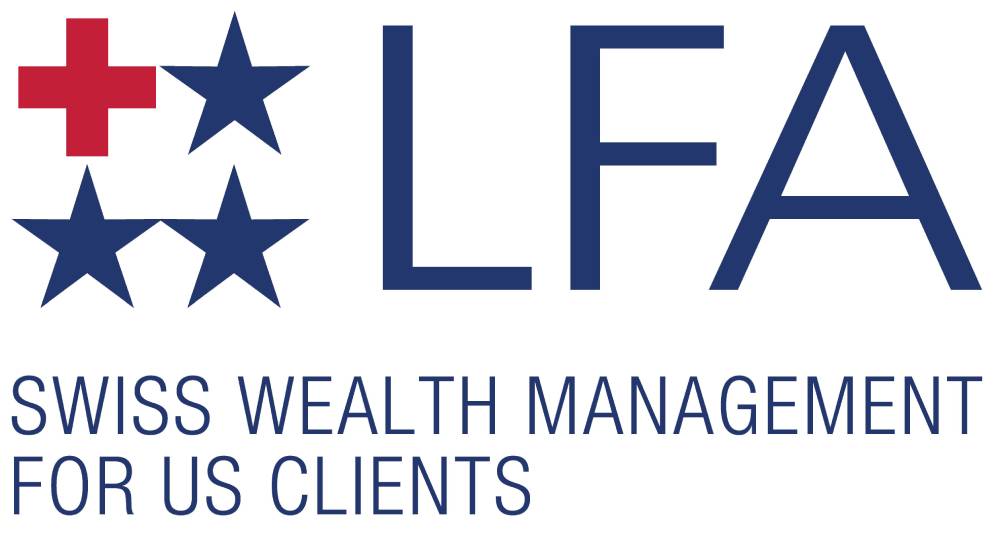The geographical boundaries for defining investment opportunities are rapidly blurring in today’s global economy. As a leading Swiss Wealth Management firm, the team at LFA has helped countless US-based investors navigate the ever-evolving global investment landscape and recognize the value of global investing for diversifying investment risk in their portfolios.
At a time when the U.S. market is experiencing current and future uncertainty, international markets can provide much-needed balance and stability. However, with these additional opportunities for growth and diversification, global investing also introduces new challenges and risks.
Sophisticated global investors need a comprehensive understanding of these factors to make informed decisions and optimize their financial journeys. These factors include currency risks, the impact of geopolitical events, and wide variations in tax laws, to name a few.
As your wealth management partner, we aim to help you explore the wide universe of global investing and equip you with the necessary knowledge to navigate its complexities. Ultimately, with the right guidance, the benefits of global investing can significantly outweigh any potential risks.
In this Quick Guide, we will explore the following topics:
Chapter 1: Benefits of Global Investing for U.S. Residents
Chapter 2: Risks of Global Investing for U.S. Residents
Chapter 3: Using Global Investing as a Hedge Against U.S. Inflation and Currency Depreciation
Chapter 4: Global Investing Tax Considerations
Chapter 5: An Overview of Swiss Wealth Management
Chapter 6: Advantages and Challenges of Partnering with a Swiss Wealth Manager
Chapter 7: Comparing US-Based Wealth Managers to Swiss-Based Wealth Managers
Benefits of Global Investing for U.S. Residents

Global investing refers to the strategy of diversifying your investment portfolio by investing in companies that are headquartered in different countries. It involves buying stocks, bonds, and alternative investments worldwide in established and emerging markets. This approach extends beyond the US market, seeking to maximize investments in global leaders worldwide.
LFA Insights: If you drive a German car and wear a Swiss watch, you are already a global consumer. Global investors often match their investing habits with their buying habits.
The primary value of global investing lies in its potential for diversification and investing in the best companies globally. By spreading investments over various markets, you can manage certain risks more effectively – for example, political stability and policy.
Spreading this risk across the globe versus one country has the potential to reduce risk and improve rates of return.
Risks of Global Investing for U.S. Residents
Global investing can offer an excellent opportunity for diversification and potential growth for you as a sophisticated investor. However, it also comes with a unique set of risks you should be aware of.
Here are five risks associated with global investing for U.S.-based investors:
- The value of foreign investments can change significantly when a country’s currency rises or falls against the U.S. dollar. This can impact the total return of the investment when converted back to US dollars. Countries with unstable political or economic conditions can also experience significant currency devaluations.
- Each country has its own unique set of political, economic, and social risks. Changes in government, political unrest, economic instability, or international conflict can greatly impact the value of investments within these countries. These can result in sudden and unpredictable market volatility.
- Countries have a variety of laws and regulations that impact businesses and securities markets. You should understand these regulations because sudden changes can impact investment performance. Also, in some countries, investor protections may be far less than what investors are accustomed to in the US.
- Economic factors such as inflation and interest rates can impact the performance of your investments. These factors can vary widely from one country to another. Similarly, various markets can have different levels of liquidity, which can impact the ease with which you can sell less liquid investments.
- Because tax laws vary by country, international investments may have tax implications abroad and in the US. Understanding and managing these tax liabilities can be complex, but with proper planning and advice, investors may be able to minimize lesser-known tax liabilities.
LFA Insights: Before investing globally, it’s crucial to seek advice from global financial advisors who are well-versed in the opportunities and the risks.
Using Global Investing as a Hedge Against U.S. Inflation and Currency Depreciation

Investing globally can provide a hedge against domestic inflation and currency depreciation by offering diversification, potentially higher returns, and increased exposure to faster-growing markets. It’s important, however, for investors to understand the risks and complexities associated with investing in these markets.
Here are five ways that U.S-based investors can use global investing as a hedge:
- Investing in developed countries in Europe, Asia, and Australia may offer more stability than investing in emerging markets. They will have more robust regulatory systems, developed infrastructures, and stable political climates. This makes them more predictable. Securities in these markets may also pay higher dividends than a similar investment inside the U.S.
- While emerging markets (less developed countries) may carry higher investment risks, they may also have the potential for higher returns. These economies, particularly in Asia, Africa, and South America, are growing more rapidly than mature countries. One example is population growth. Investing in these markets can act as a hedge against U.S. inflation and provide significant upside potential at the same time. Also, the currencies of some emerging markets may appreciate against the U.S. dollar in the future, providing an additional layer of protection against currency depreciation.
- Real estate in foreign countries can be a tangible asset that provides a hedge against inflation and currency depreciation. For instance, purchasing property in a country with a strengthening currency and a growing economy can result in capital appreciation and increased rental income with a stronger currency.
- Investing in foreign bonds can provide a steady income stream and act as a hedge against inflation and currency depreciation. Bonds from countries with higher interest rates can offer attractive yields. However, investors need to be mindful of the credit risk associated with these bonds and the potential for capital losses if the currency of the bond-issuing country depreciates against the U.S. dollar.
- Global mutual funds and ETFs may offer an efficient way to gain exposure to a diversified portfolio of international stocks and bonds. Professional portfolio managers with expertise in international investing manage these funds. They can also provide a positive hedge against domestic inflation and currency devaluations.
Because the tax implications of global investing can be complex, consulting with a tax professional is recommended to understand the potential tax liabilities.
LFA Insight: It’s important to note that while global investing can boost returns and hedge risks, it takes expert advice to maximize your returns. Therefore, you should conduct due diligence or seek professional advice when investing globally.
Global Investing Tax Considerations

Certainly, investing on a global scale can provide diversification to reduce risk and the potential for significant returns, but as already noted, it also comes with complex tax considerations. The rules and regulations vary greatly between countries, so it’s essential to understand how these could impact your returns.
LFA Insights: LFA is a Swiss-based wealth management firm licensed to provide advice and services to investors.
The following are five global investing tax considerations for U.S. investors:
- U.S. citizens are taxed on their worldwide income. If you pay foreign taxes on your investments, you may be eligible for a Foreign Tax Credit that could offset the U.S. taxes that you may owe. However, you must meet certain requirements to claim this credit and submit specific forms, such as IRS Form 1116.
- The U.S. has tax treaties with several countries that can affect how your international investments are taxed. These agreements, called Double Taxation Agreements (DTAs), generally aim to avoid double taxation, where an investor would pay taxes on the same income in more than one country. Understanding these treaties can help you make strategic decisions for investing your assets more efficiently.
- Dividends from foreign corporations are generally subject to U.S. federal income tax. Moreover, the foreign country might also withhold taxes on these dividends. However, depending on the tax treaty between the U.S. and that foreign country, you may qualify for a reduced withholding rate or even a refund of part of the foreign taxes that are withheld by other countries.
- Passive Foreign Investment Companies (PFICs) are foreign corporations that meet either an income or asset test that shows it is a company primarily earning passive income or holding assets producing passive income. If you invest in PFICs, the tax implications can be complex and potentially disadvantageous. Special tax rules apply that can result in high tax rates and interest charges unless investors elect to treat the PFIC under one of the alternative taxing regimes (Qualified Electing Fund or Mark-to-Market).
- If you hold foreign assets at your death, they might be included in your estate for U.S. estate tax purposes, resulting in a significant tax liability for your heirs. Similarly, gifting foreign assets might trigger U.S. gift taxes. Consider working with an estate planning/tax attorney to understand how to structure your international holdings to benefit heirs and other interests.
These considerations are a few of the more important factors regarding the impact of global investing. Depending on your circumstances, other issues, such as the U.S. Foreign Account Tax Compliance Act (FATCA), foreign real estate ownership, and various disclosure requirements, may also be applicable. It’s always a good idea to consult with a tax advisor specializing in international tax law to ensure you’re making the most of your global investments while complying with all relevant tax laws.
An Overview of Swiss Wealth Management

For centuries, Swiss wealth management has been synonymous with sophisticated investing practices and high-level wealth preservation. Its storied traditions for centuries of providing bespoke wealth management services stems from a culture of discretion, conservatism, stability, and a nuanced understanding of global financial markets.
Swiss banks and wealth managers are also well known for their keen ability to construct sophisticated portfolios that can defend against economic downturns while featuring a balanced mix of stocks, bonds, cash equivalents, and alternative investments in global portfolios.
Swiss banks and wealth managers also leverage trusts, foundations, and other sophisticated structures to help clients minimize their global tax exposure. However, it is important to remember that tax mitigation strategies should always be guided by compliance with country-by-country applicable laws and regulations, including the US and Switzerland. Professional advice is key to navigating complex global markets effectively and complying with applicable laws and regulations.
LFA Insights: These characteristics make Swiss wealth management a compelling choice for US-based investors who have accumulated significant wealth and are seeking sophisticated, global investment management.
Advantages and Challenges of Partnering with a Swiss-based Wealth Management Firm
Partnering with a Swiss wealth manager can offer a variety of advantages but also presents certain challenges. The following are five advantages and challenges for U.S.-based investors:
What are the advantages?
- Swiss wealth managers have expertise in global financial markets, which can help U.S. investors diversify their investment portfolios, spreading risk across a wider range of countries and companies.
- Switzerland has a long-standing reputation for financial stability and discretion. Its strong regulatory environment and prudent banking practices can offer additional security for our client’s assets.
- Swiss wealth managers are knowledgeable about international tax laws and can potentially provide strategies for improving tax efficiency while complying with U.S. laws and regulations.
- Due to their extensive global networks and relationships, many Swiss wealth managers have access to unique or exclusive investment opportunities that may not be available to individual investors.
- Investing through a Swiss wealth manager can also provide exposure to the Swiss franc, traditionally viewed as a haven during economic uncertainty, which can be a hedge against volatility in other countries currencies.
What are the challenges?
- The regulatory environment for international finance is complex and can lead to potential difficulties for U.S. investors. The U.S. and Switzerland have strict regulations regarding tax evasion and money laundering, so it’s important to be cautious and transparent.
- Be sure that you understand the fee structure when enlisting the services of a Swiss wealth management firm. These may include management and transaction fees and other charges that can impact your net investment returns.
- While Swiss banking has modernized its practices considerably, its reputation for secrecy can sometimes lead to transparency concerns, especially considering the cross-border nature of the relationship.
LFA Insights: Investors must consider their unique circumstances and financial goals and do thorough due diligence before making any wealth manager selection decisions. You may want to consult with a domestic financial advisor, Like LFA, who is familiar with international investment to ensure all legal and financial bases are covered.
Comparing U.S.Based Wealth Managers to Swiss-Based Wealth Managers
Although the US and Switzerland both host strong arrays of wealth managers, there are key differences that savvy investors should be aware of. By understanding these differences, you can make informed decisions that align with your financial circumstances and goals.
Swiss and U.S. wealth managers operate under different regulatory frameworks. U.S. wealth managers are subject to regulations from bodies like the Securities and Exchange Commission (SEC) and must comply with U.S. federal and state laws.
On the other hand, Swiss managers are regulated by the Swiss Financial Market Supervisory Authority (FINMA). The Swiss banking secrecy laws have been reformed to be more transparent but still provide confidentiality that is not available in the U.S.
Swiss wealth managers are often associated with more conservative, long-term investment strategies and risk management disciplines focused on preserving wealth.
On the other hand, U.S. wealth managers might be more open to innovative investment strategies, including alternative investments and growth-focused strategies. Both can be suitable for different types of investors, depending on their personal risk tolerance and investment goals.
In general, U.S. wealth managers have more experience with the intricacies of U.S. tax laws and can provide better guidance on strategies to minimize tax exposure for U.S.-based investment returns.
Swiss wealth managers, however, may offer more expertise on international tax laws, including ways to structure assets and income streams to minimize global tax exposure.
Swiss wealth managers typically have more experience diversifying client portfolios across different geographies, economies, and currencies. This can provide a hedge against geopolitical risks and currency fluctuations.
While U.S. wealth managers may offer global management, they tend to be more focused on companies that are headquartered in the U.S.
While both U.S. and Swiss wealth managers emphasize the importance of client relationships, there may be differences in their approach. Swiss wealth managers are often associated with a more traditional, personal style of service and longer-term client relationships. U.S. wealth managers, particularly those at larger firms, may focus more on scalable services and technology-driven solutions.
It’s important to note that these are generalizations, and there are wealth managers in both the U.S. and Switzerland who may not fit these molds. As an investor, it’s important to thoroughly evaluate any wealth manager or financial advisor before selecting them to manage your assets.
LFA Insight: LFA is a Swiss-based firm registered with the SEC to manage assets for U.S.-based investors.
About LFA
LFA, a premier Swiss financial advisory firm, offers specialized wealth management services to U.S. investors interested in diversifying their assets internationally. We cater to the distinct needs of our clients, offering personalized advice focused on performance, risk, and tax exposure.
Our vast experience, coupled with exceptional networks that include Swiss banks, international law firms, estate planners, cross-border private client services, and Certified Public Accountants (CPAs) provides unparalleled services and benefits for our clientele.
Our Client-Centric Approach
At the heart of our business is a client-focused philosophy that prioritizes high-quality financial advice and services. We equip our clients with the knowledge, discipline, and resources they need to achieve their financial goals.
LFA Insights: We can expand our services to include other professionals (CPAs, estate planning attorneys) who are also advising our clients. This collaboration ensures our clients receive coordinated advice and services while minimizing conflicting advice and duplicate fees.
Global Investment Principles
Astute investors acknowledge diversification is their best strategy for minimizing their risk of large losses. We advocate for global investment by leveraging global currencies like the Swiss franc while diversifying our clients’ assets beyond domestic securities markets.
LFA is duly registered with the U.S. Securities and Exchange Commission (SEC), authorizing us to offer financial advice and services to U.S. citizens for fees. LFA is also registered with the Swiss Financial Market Supervisory Authority (FINMA), providing services similar to the SEC.
To learn more about LFA’s global investment service, we invite you to connect with us.

